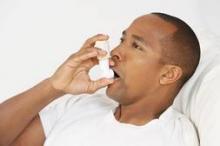Adults who have asthma are at significantly greater risk than are those who don’t for developing obstructive sleep apnea, according to a report published Jan. 13 in JAMA.
“Accumulating evidence suggests a bidirectional relationship between asthma and obstructive sleep apnea, whereby each disorder deleteriously influences the other,” said Dr. Mihaela Teodorescu of the University of Wisconsin, Madison, and her colleagues.
To understand the “initiating processes of a potentially self-enforcing asthma-apnea cycle,” the investigators analyzed data from the Wisconsin Sleep Cohort Study, a population-based longitudinal epidemiologic investigation of the natural history of obstructive sleep apnea that began in 1988 and followed participants at 4-year intervals for up to 24 years. For their analysis, Dr. Teodorescu and her colleagues focused on a subset of 547 participants.
In their first 4-year follow-up intervals, 22 of 81 participants with preexisting asthma (27%) developed incident obstructive sleep apnea, compared with 75 of 466 participants who didn’t have asthma (16%). When all the interval observations were considered, there were 45 cases of obstructive sleep apnea among 167 possible intervals in participants who had preexisting asthma, for a rate of 27%, and 160 cases among 938 possible intervals in participants without asthma, for a rate of 17%. Compared with people who didn’t have asthma, those who did showed a relative risk of 1.39 for developing apnea, regardless of potentially confounding factors such as body mass index, the investigators said (JAMA 2015 Jan. 13 [doi:10.1001/jama.2014.17822]).
This association showed a dose-response pattern when cases were categorized according to the duration of asthma, with the highest risk for obstructive sleep apnea occurring among people who had asthma of 10 or more years’ duration. The association also remained robust in numerous additional analyses, including one involving only the subset of 220 participants who had spirometry results, another involving only participants who used asthma controller medications, and a third that accounted for participants’ neck girth, waist girth, and waist-to-hip ratio.
The mechanism(s) by which asthma may predispose patients to obstructive sleep apnea is not known, but could pertain to the disease itself, its treatment, or its common comorbidities. Nighttime asthma attacks could increase pressure in pharyngeal airway tissues, or pharyngeal airway stiffness could decrease because asthma causes abrupt drops in lung volumes during sleep, or a “spillover” of systemic inflammation could weaken the respiratory muscles or trigger CNS inflammatory responses. Corticosteroid therapy could alter the architecture of the pharyngeal airway by raising or redistributing pressures in the tissues there, or it could diminish the contractility of the dilator muscles. And coexisting gastroesophageal reflux could trigger pharyngeal spasms and induce mucosal exudative neurogenic inflammation, Dr. Teodorescu and her associates said.

